12 Ways Manufacturers Can Manage Human Resources and Payroll with ERP
Chelsea Carter

Building Materials Manufacturers already know that an ERP implementation can transform any organization into a more productive, optimized, and profitable version of itself by streamlining and enhancing operations, communication, and business intelligence from the warehouse to supply chain management to accounting. But many aren't aware of a lesser-known benefit of an organization-wide cloud ERP (Enterprise Resource Planning) tool---ERP for human resources.
Yes, the tool that successful companies use to manage operations can also help you organize your most valuable resources--your people. Here are just some of the many benefits.
1. HIRING AND STAFFING APPROPRIATELY
An ERP can support human resources and help companies better understand their staffing needs so that they can plan and spend accordingly with less payroll waste by supporting HR and management's understanding of:
- Seasonal changes
- Growth and expansion
- Turnover
- Performance and Attendance
2. MORE EFFICIENT RECRUITMENT PROCESSES
One of the most vital roles an HR department serves is finding and attracting the right people in the first place. An investment in enhanced recruitment tools is an investment in your people, culture, and the company as a whole.
HR ERP implementation provides the recruitment data and tools to improve where, when, and how recruiters find the best hires. It enables more data-driven hiring decisions and enhances the recruitment process from talent's side perspective as well. By doing so, your company puts its best foot forward when approaching and courting top talent, especially those who may currently work for your competitors.
3. TIME MANAGEMENT AND ATTENDANCE
A cloud ERP helps department managers and HR better understand productivity and scheduling needs not only to plan based upon historical data but to continually improve processes, which can:
- Reduce absenteeism
- Eliminate presenteeism
- Identify high performers for potential promotion
- Better understand the correlation between overtime and productivity to make sure you're getting most out of extra pay
4. SELF-SERVICE PORTALS
An early 2019 SHRM survey found that 78% of HR respondents were using HR employee self-service tools in their organization, and 68% had similar tools for management. ERP for human resources has enhanced employee and manager self-service options that free up human resource staff from mundane or repetitive tasks that don't exist when employees have more direct access to information and tools to do for themselves.
5. TRAINING AND DEVELOPMENT
With ERP implementation, HR can better:
- Observe completion of mandatory training
- Track who has completed what and send automated reminders
- Develop and deliver digital training options
- Improve training program to better prepare employees for their roles
6. MANAGING BUSINESS TRIPS
It's important to employee peace of mind and accurate accounting that expense submissions and reimbursement happen quickly and accurately. Reviewing and signing off on expenses can be a fast, streamlined process. An ERP for human resources can improve reimbursement processes, including invaluable features like automated expense verifications and flagging expenses that need a closer look.
7. AUTOMATION
Automation is often underutilized within organizations simply because they don't know that tools exist that can automate just about anything. HR departments function best when they manage exceptions and can automate tedious and repetitive tasks. Additionally, in many areas of HR, timing is everything. Automation supports the human resources department's efforts to provide what employees and management need quickly and competently, further enhancing workflow while reducing human error and delay.
8. ENHANCED COLLABORATION
ERP implementation makes communication and collaboration easier. When something is easier, you can more effectively integrate enhanced collaboration into workflows across departments to streamline operations.
9. UP-TO-DATE
The modern cloud ERP is a real-time tool in two crucial ways.
1) It's mobile-first, which means that employees can update it from anywhere they're working and don't have to wait until they get back to their desk
2) It's continually collecting data from various departments, compiling it, and presenting it in the most useful form to those who need that information to make decisions.
10. CUTTING COSTS ON LICENSING
Many HR departments work with 4-5 programs that serve various functions, and these tools probably don’t communicate with each other, meaning that people have to manually transfer information to keep them up-to-date. Each one represents a separate cost for licensing. ERP implementation can replace all of these tools with one that can be customized to be everything to everyone.
11. BETTER ANALYTICS
HR ERP delivers real-time analytics and actionable business intelligence. And, because it is up-to-date, HR and management can make on the spot decisions with confidence.
12. ENSURE COMPLIANCE WITH HR LAWS AND BEST PRACTICES
HR compliance can both prevent lawsuits and enhance employee experience so that you retain top talent. An ERP system makes it easier to keep all of HR's documentation in order and easily accessible as needed.
ERP FOR HUMAN RESOURCES
ERP implementation can enhance operations throughout an organization. That includes human resources and the ability to improve recruitment and training, keep top talent, and lift productivity. Manobyte's team of experts can help you enhance operations, improve core business processes, strengthen inter-departmental communication, and boost business intelligence through customized NetSuite ERP implementation solutions. Let's connect to discuss your business needs and goals.

